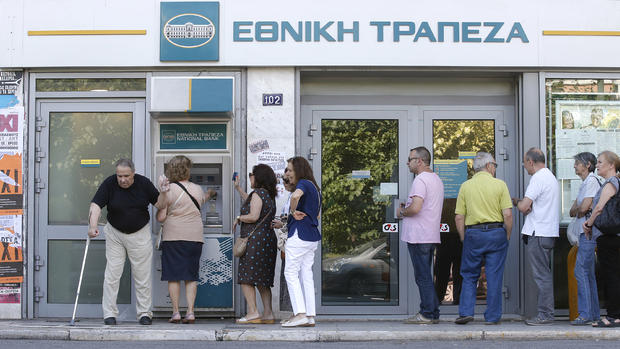Panic, frustration as Greece nears debt default
ATHENS -- The world financial markets took a major hit Monday from the debt crisis in Greece. The Dow lost 350 points. The S&P was down more than two percent, as was the NASDAQ. Greece can't pay creditors and will likely go into default tomorrow.
Greeks will vote this weekend on whether to accept strict austerity in exchange for a bailout or drop the euro as its currency, something that has never happened in Europe before.
For six years, Greeks have had their taxes raised and their pensions slashed. And once again Monday, they took their anger to the streets of Athens.
"I see myself like I have no future," said Dimitrios Kalogeropoulos, a mechanical engineer who -- like a quarter of all Greeks -- is unemployed. He's furious that Greece's foreign creditors are demanding more tax hikes and spending cuts.
"They say we want this, and nothing more, and nothing else," he said. "And this is humiliating. Of course it's humiliating."
As Greece teeters on the verge of bankruptcy, some have panicked -- withdrawing $1.5 billion from their accounts since Friday.
The Greek Prime Minister Alexis Tsipras vowed that nobody would lose their savings and called for calm.
But the government was so worried there could be a run on the banks, it ordered them to shut for a week and limited withdrawals to just $70 a day.
Hit hard by the financial crisis of 2008, Greece's economy never recovered and after two financial bailouts, it's drowning in more than $250 billion of debt, including nearly $2 billion due Tuesday which it cannot pay.
In January, Greece elected a left-wing government that promised to renegotiate with foreign creditors. But instead of getting a better deal, on Friday Greek officials walked out of talks to extend the bailout, signaling they'd rather default on the country's loans than accept more cutbacks.
If Greece votes "no" to the terms of the bailout in the referendum on Sunday, it could then default on a series of loans, bringing more hardship to Greece and even forcing the country to leave the single European currency. That's never happened before in Europe, and just the fear of it spooked international markets.

